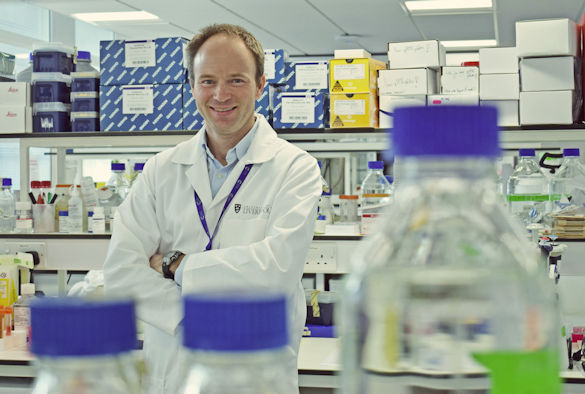
Dr Michael Schmid
University of Liverpool scientists have been awarded £1.5million by Cancer Research UK to help boost understanding about pancreatic cancer – one of the deadliest cancers.
The University’s Institute of Translational Medicine is leading the study and will analyse tissue and blood samples from pancreatic cancer patients being treated at Royal Liverpool Hospital and Aintree University Hospital to investigate how pancreatic cancer spreads to other parts of the body.
The six-year research programme ultimately aims to help develop new strategies and drugs to improve treatments for pancreatic cancer patients.
Immunotherapy
Survival rates for pancreatic cancer remain very low with around 8,700 people dying from pancreatic cancer each year in the UK, including around 930 people in the North West.
Immunotherapy – a type of biological therapy that is used to stimulate the immune system to help the body fight cancer – has recently shown to be beneficial for several different types of cancer but unfortunately it has so far not shown much promise for pancreatic cancer patients. This study will look at why that might be the case and aims to find new “druggable” targets to tackle this hard-to-treat cancer.
Scientists will explore the cancer tumour’s microenvironment – the cells in and around the tumour – which interact together to promote and help the cancer cells to spread.
Prevention
Dr Michael Schmid, who is leading the international study, said: “Pancreatic cancer develops in the pancreas but cancer cells can spread aggressively to distant sites in the body – a process called metastasis – meaning patients can get metastatic – or secondary – tumours.”
“Over the last few years it has become clear that normal cells surrounding the cancer cells – called stromal cells – are as important as the cancer cells themselves. The tumour seems to be hijacking these cells and uses them to rapidly grow. We need to find out how this happens and how we can prevent this.”
“What’s different about this study is that we will be looking at what these stromal cells are doing once the tumour has spread to another part of the body – in this case the liver. This could allow us to find new drugs to prevent metastasis of pancreatic cancer.”
‘Hard to treat’
Pancreatic cancer is one of the most difficult to treat cancers and the funding from Cancer Research UK is part of the charity’s commitment to targeting these hard-to-treat cancers.
Matt Kaiser, Head of Discovery Research at Cancer Research UK, said: “Thanks to research we’re making progress in treating more cancers, but some types, are still very hard to treat.
“That’s why we’re boosting our efforts into cancers, like pancreatic cancer, where survival rates are low.
“This research will help us to understand more about what makes pancreatic cancer spread to other areas of the body and why current immunotherapy treatments are not successful for this type of cancer.
“We hope it will ultimately help to inform new strategies to help treat pancreatic cancer patients whose cancer has spread to other parts of the body, who desperately need better treatments.”
Important
The Liverpool team will also work with researchers at the University of Glasgow, Edinburgh, Cambridge, CR-UK MedImmune Alliance Laboratory and Cold Spring Harbor Laboratory in New York.
The research has also been welcomed by Peter Breaden, a retired lab manager and grandfather of nine from Churchtown, Southport, who was diagnosed with pancreatic cancer in April 2010 and successfully treated on a Cancer Research UK clinical trial.
The 67-year-old, from Southport, said: “As a pancreatic cancer survivor it’s great to see Cancer Research UK investing more into research right here in Merseyside looking at pancreatic cancer.
“Further research is really important to help boost understanding of pancreatic cancer and how it spreads and to pave the way for more treatments.”